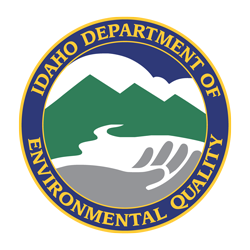Permitting authority for storm water permits will transfer to DEQ from EPA on July 1, 2021.
Storm water is rain or melting snow that does not immediately soak into the ground. Storm water runs off of land and hard surfaces such as streets, parking lots, and rooftops, and picks up pollutants such as fertilizers, dirt, pesticides, and oil, and grease. Eventually, storm water soaks into the ground or discharges to surface water (usually through storm drains), bringing the pollutants with it.
Construction activities that disturb 1 acre or more of land, including clearing, grading, and excavation activities; industrial activities specifically listed by the US Environmental Protection Agency; and municipal storm drains are considered point sources of pollution (i.e., a source of pollution that comes from a discrete pipe or other point) and require an Idaho Pollutant Discharge Elimination System (IPDES) storm water permit.
To apply for storm water permits, go to DEQ’s E-Permitting system. For assistance, please contact the IPDES E-Permitting Support at (833) 473-3724 or IPDESE-Permitting@deq.idaho.gov
This accordion will not appear on the screen
Owners and operators of construction projects that: 1) disturb one or more acres (or are part of a common plan of development that disturbs one or more acres) and 2) discharge storm water, must obtain coverage under the storm water construction general permit (CGP). The CGP requires best management practices (BMPs) to reduce the sediment and other pollutants discharged in storm water. The CGP requires periodic inspection of construction projects by persons knowledgeable about erosion and sediment control and pollution prevention.
Certain industrial facilities meeting appropriate criteria must seek coverage under the multi-sector general permit (MSGP) for stormwater. Coverage is based on the facility’s standard industrial classification (SIC) code. Facilities commonly covered in Idaho include mines, airports, and junkyards, as well as facilities that process food, cement products, wood products, and metal products. If a facility with a SIC code requiring MSGP coverage does not have any industrial activities or materials exposed to storm water, the facility may qualify for a no exposure certification (NEC).
Municipalities meeting appropriate criteria must seek coverage under a separate municipal storm sewer system permit (MS4). MS4s are regulated as large/medium (Phase I) or small (Phase II) systems. Phase I systems are defined as cities or certain counties with populations of 100,000 or more. Phase II systems are areas that have been defined as urbanized by the US Census Bureau. Urbanized areas that are owned by separate municipalities may be covered under one permit. DEQ evaluates the need for designating other small MS4s for regulation according to the IPDES Designation Criteria and Selection Process for Small Municipal Separate Storm Sewer Systems.

